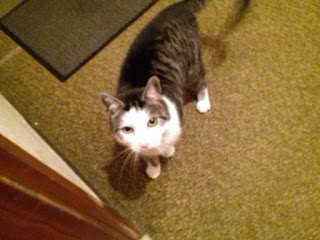English Tenses Part One: The Simple Present
Tom collects model cars.
Tom doesn't collect model planes.
Does Tom collect model cars?
The boys collect stamps.
The boys don't collect coins.
Do the boys collect coins?
Tom is angry.
Tom isn't sad.
Is Tom sad?
The boys are smart.
The boys aren't stupid.
Are the boys smart?
I am clever.
I am not stupid.
Am I clever?
I study, he studies
I go, he goes
I catch, he catches
I hurry, he hurries
I must, he must, I can, he can
Die Verwendung des Simple Present:
Regelmäßige Ereignisse
Sich wiederholende Ereignisse
Hobbys
Berufe
Fahrpläne, Stundenpläne u.a.
Exercise 1: Positive Sentences
The tomcat usually _________ through the house in the afternoon. (walk)
The police usually _________ thieves and burglars. (catch) (Take care: There is always more than one officer, therefore the police = they.)
Paul _______ breakfast at half past six and ________ the house at seven o'clock. (have, leave)
Timmy ___________ coins. It _______ his favorite hobby. (collect, be)
Mr Jones ________ at a bank. He _______ loans. (work, arrange)
My train ______ tomorrow at 6 o'clock. (leave) I must get up early.
If Tommy ___________ (get) a good mark in English his parents will be proud. (get)
Exercise 2: Negative Sentences
Tommy ________ chocolate. (not like)
Paul _________ hockey. (not play)
The Smiths _________ in London. (not live)
Sabrina _________ coins. (not collect)
Alan and Silvia ________ married. (not be)
The cat _________ being teased. (not like)
I ________ to the cinema very often. (not go)
Tom ________ lazy. (not be)
The dog _________ unless there is a stranger near the house. (not bark)
Students _________ many novels nowadays. (not read)
Exercise 3: Questions
______ Peter _______ hockey? Yes, he does. (play)
______ the boys ______ badminton? Yes, they do. (play)
______ Sabrina ______ horror movies? No, she doesn't. (like)
______ the cat usually _______ on the kitchen table? No, it doesn't. (sleep)
______ the dog often ______ at night? Yes, it does. (bark)
_____ the Foresters _______ in Budapest? Yes, they do. (live)
______ Mr Taylor often _______ detective movies? Yes, he does. (watch)

Kommentare
Kommentar veröffentlichen